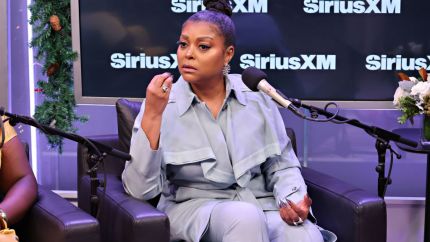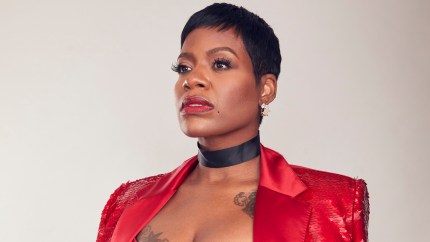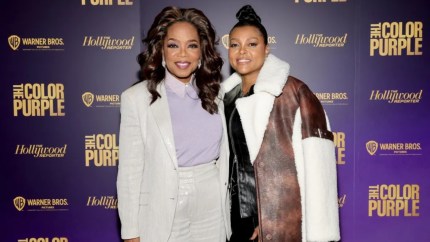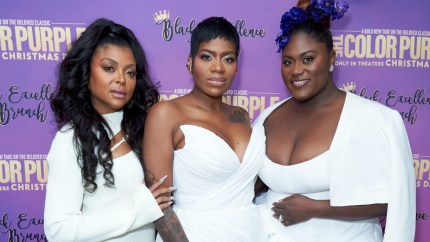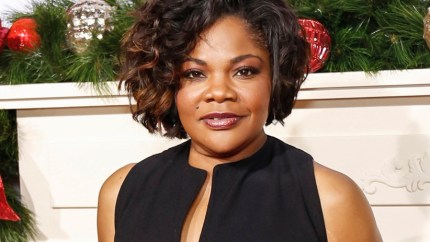This Christmas, Taraji P. Henson gave ‘a special gift’ many of us need
With her admission of how pay disparity has affected her otherwise illustrious career, Taraji P. Henson gave voice to legions of Black women.
“Notes on faith” is theGrio’s inspirational, interdenominational series featuring Black thought leaders across faiths.
Mo’Nique was right; there, we said it. The Oscar-winning actress, comedienne and talk show host told no lies when, after allegedly being “blackballed” within the industry and amid a subsequent bias dispute with Netflix, she talked about the persistent pay disparities Black women in Hollywood face and often fight alone, regardless of their accomplishments.
“It’s cost my family millions. It’s cost us generational money,” she said during a 2020 appearance on “Out Loud with Claudia Jordan.”
“[W]hen you know the history of Hattie McDaniel, when you know the history of Eartha Kitt … they gave everything, and the moment they say something ain’t right, they became ‘difficult;’ they became blackballed,” Mo’Nique further explained. “[A]nd most of them died in despair — alone with no families — because they gave it all to a place called Hollywood.”
During a recent interview with Gayle King for the press rollout of the highly anticipated musical film adaptation of “The Color Purple,” Oscar-nominated actress Taraji P. Henson tearfully echoed Mo’Nique’s concerns, reviving a sobering conversation about pay disparity, even amidst growing fanfare over her performance as Shug Avery.
“It seems every time I do something and I break another glass ceiling, when it’s time to renegotiate, I’m at the bottom again, like I never did what I just did,” Henson confessed, explaining why she’s considered leaving acting altogether. Across industries, her story is resonating for Black people — and for Black women, especially — because their exploitation is the American way.

Henson and Mo’Nique, along with fellow Oscar winners Halle Berry, Viola Davis and Octavia Spencer, and two-time nominee and Academy honoree Angela Bassett, among others, have long told us how major studios and production companies neglect to provide nuanced casting opportunities and competitive compensation for Black women actors, regardless of the accolades and acclaim they receive in the entertainment industry. When Black women receive Emmy, Oscar, Tony or Grammy nominations/wins, these commendations are unfortunately no indicator of the “inevitable pay raise” that white male actors can expect. In fact, Viola Davis made the issue plain in a 2018 conversation with Porter magazine:
“If Caucasian women are getting 50 percent of what men are getting paid, [Black women are] not even getting a quarter of what white women are getting paid. … But guess what: I deserve it too. So does Octavia Spencer, Taraji P. Henson, [and] Halle Berry. We’ve put the work in, too.”
It’s not hyperbole; as Black Women’s Equal Pay Day reminds us each year, pay for Black women in comparison with other demographics in the workforce shows the disparity issue is far bigger than what’s going on in Hollywood. This is a burden that dates back to our foremothers, and we must make the sacrifices imposed upon them worth it. We must learn the lesson and advance the cause whenever we can.
This holiday season, Henson gave us a special gift, modeling the tough and ongoing work of self-advocacy. Regardless of who is made uncomfortable by our grievances, there is someone who will benefit from us naming the injustices aloud. Choosing one of the largest platforms of her career to tell her truth, Henson demonstrated the importance of divesting from the perception of celebrity or modern-day “superwoman;” that temptation to look like we have it all together, and that we have “arrived.” Like Mo’Nique before her, she disrupted business as usual and named her discontent.
And we are listening.
Henson’s disclosure of her pain and disillusionment inspires us to confront the realities of knowing our worth, unapologetically fighting for respect and sustainability, and standing firm on our business — whether great or small. She demonstrates to us what it looks like to transition into a season of maturity within our community, share knowledge and use transparency to empower others to do better because she is willing to confront the hard things along the way.
We need faith to stand firm in our resolve, despite fear and trembling as we raise our voices, to have the tough conversations and draw people’s attention to injustice, even in the midst of acclaim.
How can we allow things to go on as usual if even one of us is exploited or cheated?
Recommended Stories
The witness born of intersectional experience matters when considering equitable compensation regardless of gender, pedigree, hue or corporate access. In an effort to level the playing field, Black entertainers such as Will Smith, Beyoncé and the late Chadwick Boseman have recognized pay disparities in comparison with their colleagues, choosing to split or donate their earnings. While such gestures are admirable, they are not sustainable because they place the onus on a privileged few while letting corporate entities off the hook in setting a precedent for fair compensation.
Furthermore, such overtures ironically often become a form of divide-and-conquer that stoke resentment among the under-compensated — “house Negro vs. field Negro” tropes afresh. Don’t fall for it. A sustainable solidarity that requires faith, integrity and strategy starts with disclosure of disparity, thinking of ourselves as businesses with several sources of income and as institutions with operations that need to be profitable. We must be collectively clear on our pay scale and our non-negotiables.
We must demand the market rise to meet our worth. We deserve to profit — tuh — for ourselves, the ancestors, and those to come.
In confronting the blatant realities of pay disparities in the entertainment industry amid the broader spiritual and existential reflections of the Christmas season, we find a profound lesson in spiritual resolve. We are encouraged to be the authors and architects of our terms of engagement, the keepers and enforcers of the non-negotiables required for us to show up well and share our respective gifts. As the testimonials of too many Black women in Hollywood and beyond echo the need for recognition and equitable compensation, the Christmas narrative reminds us of our intrinsic value and the power of transformative hope. We cannot afford to play nice and hope that our turn will come.
This season, we are called not only to recognize the systemic challenges faced by individuals like Henson, her peers and her predecessor, but also to recognize our individual worth. We are called to embrace the deeper message of Christmas: the birth of new possibilities and the empowerment to effect change in our individual and collective journeys.
As sung by Bishop Walter Hawkins and the Love Center Choir in “A Special Gift”:
Heaven sent me a wonderful,
Very special, beautiful gift.
Heaven sent me a very wonderful,
Supernatural, special friend.
For us as pastors, our quest is to discover the pathways toward personal and spiritual liberation. Through the celebration of the birth of Christ, what resonates is the story of the infant born to a not-yet-married teenage mother, embodying the cosmic mandate of liberating the oppressed peoples of the world. The Biblical text prophesying the infant’s arrival was such a threat to the political construct that the leader of that time committed infanticide to eradicate it. This season represents the birth of a new reign, an era ushering in the reality that “the first will be last, and the last will be first” (Matthew 20:16). This is the special gift offered to anyone who desires to receive.
The hope that this birth narrative delivers is a sense that we are all special, that we can get “out of order” and step into an empowerment that offers a way through it all — while also becoming conduits of hope for others. Within each of us is the potential to liberate ourselves and birth an idea that can inspire economic empowerment within our communities.
When we think about the air we breathe, the sun that lights the day and the moon and stars that illuminate the night, yes, there are inevitable challenges we observe and experience. Whether the personal challenges of finances, the loss of relationships, opportunities or known comforts, these ordeals can leave us exhausted. However, when we think of the special gift of the Christmas season, represented through the celebration of the birth of Christ, we can find that even in our most difficult of experiences, applying faith to craft a special gift of our own making.
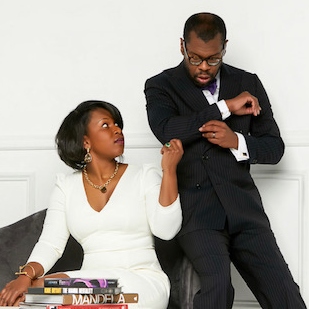
Rev. Dr. Alisha Lola Jones is a faith leader helping people to find their groove in a fast-paced world, as a consultant for various arts and faith organizations and professor of music in contemporary societies at the University of Cambridge in Cambridge, England. She is an award-winning author of Flaming? The Peculiar Theopolitics of Fire and Desire in Black Male Gospel Performance (Oxford University Press). For more information, please visit DrAlisha.com.
Rev. Calvin Taylor Skinner is dedicated to empowering frontline communities in Knoxville, Tenn. and the United Kingdom. He uses Faith and Policy to address energy justice, criminal justice reform, voter education/mobilization, electoral politics, and global affairs. Along with his wife, Rev. Dr. Alisha Lola Jones, they lead InSight Initiative, a consulting firm focusing on capacity building and live events production.
